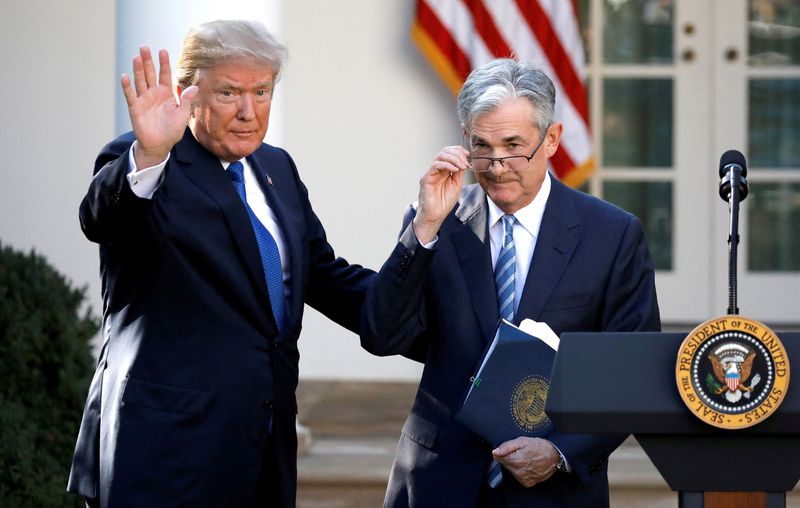By Howard Schneider
WASHINGTON (Reuters) - The election of Donald Trump threw Federal Reserve officials into a scramble to determine what it meant for the American economy, the world, and the U.S. central bank's own standing, according to transcripts of Fed meetings from 2016.
At the Fed's policy meeting a month after Trump's Nov. 8, 2016 victory, there were jokes about the unexpected outcome, warnings of the deep fissures it showed in the U.S. economy and the challenges it might pose to the central bank's independence.
"According to some interpretations of the Book of Revelations, when three unusual events occur together, they may be a sign that the apocalypse is near. Let's take stock," St. Louis Fed President James Bullard joked, referring to the final book in the Bible's New Testament and placing Trump's victory in a category with the Chicago Cubs long-awaited World Series victory that year and folk singer Bob Dylan's Nobel Prize.
"Does the recent election usher in a regime change with respect to growth prospects for the U.S. economy? The short answer to this is 'maybe,' and we are treating this as an upside risk," he said, according to one of the transcripts, which were released by the Fed on Friday.
Fed staff promptly tried to build best guesses about whether the Republican businessman would follow through with tax cuts and fiscal spending, tariffs on trading partners or new immigration rules.
The market reaction - a jump in stock prices - took some at the central bank by surprise, while others noted that their business contacts "used words like 'exuberance' and 'euphoria,'" because they expected lighter regulation and lower taxes, said Jeffrey Lacker, president of the Richmond Fed at the time.
The transcripts, which are released after a five-year lag, provide a window beyond the more scripted official statements of the day into how central bank policymakers grappled with a political event they understood from the outset could effect their work and potentially the Fed as an institution in fundamental ways.
FED INDEPENDENCE
Trump, even before his inauguration, showed an unorthodox approach to the presidency. His comments about federal contracts on Twitter (NYSE:TWTR), for example, slammed the stock prices of companies like Boeing (NYSE:BA).
At its Dec. 13-14, 2016 meeting, the Fed raised interest rates after a year of concern that the U.S. economy was slowing, and it followed up with more hikes in 2017 and 2018 as Trump's tax cuts and fiscal policies led to higher-than-expected growth.
The wind came out of the sails in 2019 as Trump's trade policies slowed global growth, validating some of the concerns noted by Fed officials in the aftermath of his victory over Democratic presidential nominee Hillary Clinton.
"If the incoming Administration changes economic policy in several areas as radically as promised during the election campaign, we will, in retrospect, view today's interest rate decision as the last of an era," then-Fed Vice Chair Stanley Fischer said.
"There will likely ... be challenges to the current operating procedures of the Federal Reserve and to its independence. We will be operating, too, in an environment in which many of the assumptions about the role of the United States in global affairs more generally that have held for more than 70 years may need to be adjusted," Fischer said, according to the meeting transcript.
Trump, after elevating then-Fed Governor Jerome Powell to the Fed chair position in 2018, would sour on his pick, publicly berating the former investment banker for raising rates, and his administration explored whether Powell could be fired.
Dennis Lockhart, who was the Atlanta Fed's president at the time, turned the gaze inward, and noted Trump's victory, with overwhelming support among white voters in rural areas, seemed rooted in economic divisions he felt the central bank needed to better understand.
"It seems to me that a lesson of the recent electoral cycle ... is the public's differential experiencing of the economy across geography, the urban–rural spectrum, and cohorts defined by educational attainment," Lockhart said. Noting that staff had added briefings on unemployment gaps by race to Fed board presentations, Lockhart said "it strikes me this reporting can go further."
